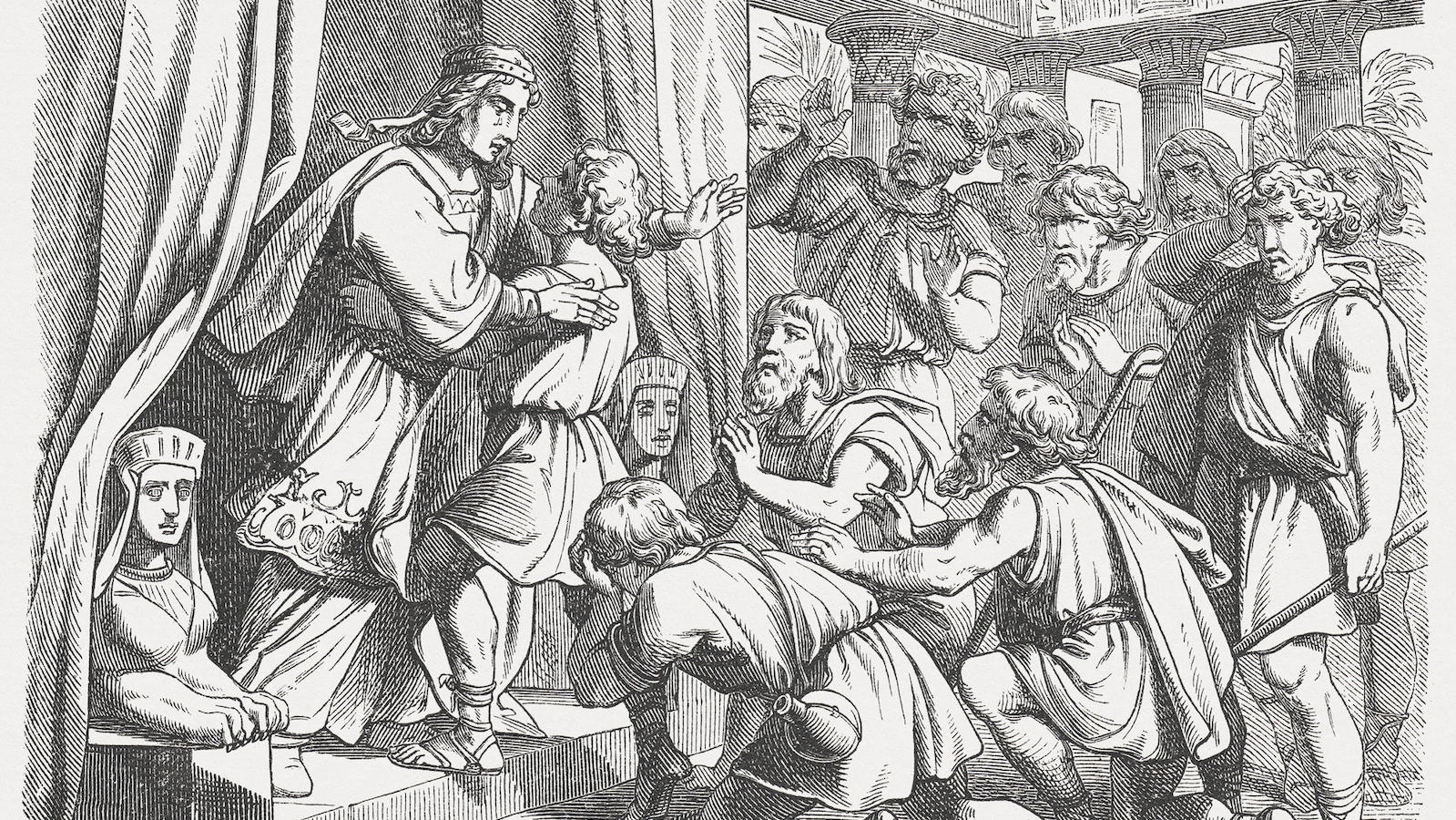Commentary on Parashat Miketz, Genesis 41:1-44:17; Numbers 28:9-15, 7:42-47
We usually think of prayer as a way of connecting to God. But this week’s Torah portion suggests that prayer can also help us connect with other people and open the way toward tikkun — repairing brokenness in our world.
Reunification
Parashat Miketz describes the slow, agonizing process of Joseph’s reunification with his brothers, who have come down to Egypt to plead for food. The Torah tells us: “Joseph recognized his brothers, but they did not recognize him.” The relationship between them, long broken since their bitter childhood, cannot be repaired so quickly. Joseph chooses not to reveal himself, taunting and testing his brothers and maintaining their estrangement.
Only when Benjamin, Joseph’s youngest and only full sibling, arrives in Egypt, is Joseph confronted with a deeper recognition of brotherhood. Choking up, he utters a short prayer of blessing:
“May God be gracious to you, my boy.” With that, Joseph hurried out, for his compassionate feelings grew hot toward his brother, and he needed to cry; he went into a room and he cried there (vayevk). Then he washed his face and returned; restraining himself, he gave the order [to his servants]: “Put out bread.” They served him by himself, and them by themselves…
Joseph’s Compassion
The encounter with Benjamin stirs Joseph’s compassion, but the short prayer cracks it open. Suddenly he feels the pain of disconnectedness from his family and is able to empathize with his brothers’ hunger and powerlessness. And yet, Joseph hides his cries. Determined to maintain his distance and power, he stifles his own emotions and offers only a terse order to give bread. He cannot and will not sit and eat with his brothers. How familiar is this feeling to those of us who see suffering or poverty and yet hold our full selves back from such an encounter, content instead merely to give a bit of tzedakah!
With your help, My Jewish Learning can provide endless opportunities for learning, connection and discovery.
And yet: “vayevk–and he cried.” This powerful word reappears at two crucial junctures in the next parashah. The first comes when Joseph finally reveals himself to his brothers. He allows his emotions to break free; he still tries to hide his cries, but the Egyptians outside the room hear him sobbing. The second comes when Joseph reunites with his father Jacob, apparently in full view of many others. At this moment of reconciliation, the process of recognition and reunification reaches its fulfillment.
A 19th-century Hasidic text, The Well of Living Waters, illuminates how prayer can be a model for tikkun olam. Commenting on the verse in which Joseph begins to recognize his brothers, it cites a teaching by Rabbi Isaac Luria, one of the founders of 16th-century Kabbalah. Luria explains why the central prayer of Judaism, the Amidah, must first be said silently, before being repeated out loud:
So it is in the way of holiness: it both disappears and is revealed. And in a place that requires full repair (tikkun) and unification (yichud), at first the unification needs to be in secret… But afterward, when the unification has been effected quietly, then one is able to raise one’s voice and to effect the unification, revealed to the eyes of all.
Unlocking the Divine Light
Luria, a mystic, believed that prayer (like other mitzvot) unlocks the Divine light in our broken world and reunites it with its Divine Source. The author of The Well of Living Waters argues that just as the Amidah must begin silently and then become loud in order to achieve tikkun, so too Joseph’s recognition of his brothers must unfold gradually, from hidden and stifled to public and open. As this recognition grows, so does its expression in Joseph’s cries, until full tikkun and yichud—repair and reunification—are achieved.
We can learn from the tikkun in Joseph’s relationship with his family that sometimes the commitment to pursue justice also needs to unfold within us in stages. Justice is—or would be—the ultimate result of a full recognition of our common humanity with others, and thus, our responsibility for others. That recognition often begins quietly within our consciousness: stirred by an encounter with another person, it may then be unlocked or revealed to us through prayer. Unsettled, we may seek to stifle this growing knowledge because of its profound implications. Some time may pass before our changes in consciousness lead to changes in our outward behavior.
Yet we are obligated to emerge eventually from our silence; to cry out against injustice, and take action. Just as the public repetition of the Amidah must follow its silent recitation, external advocacy and action are the necessary consequences of our internal awakening. Our actions can then lead to the repair of brokenness, to the release of hidden Divine light and to a closer unity between this world and its Divine ideal.
Provided by American Jewish World Service, pursuing global justice through grassroots change.
Torah
Pronunced: TORE-uh, Origin: Hebrew, the Five Books of Moses.



